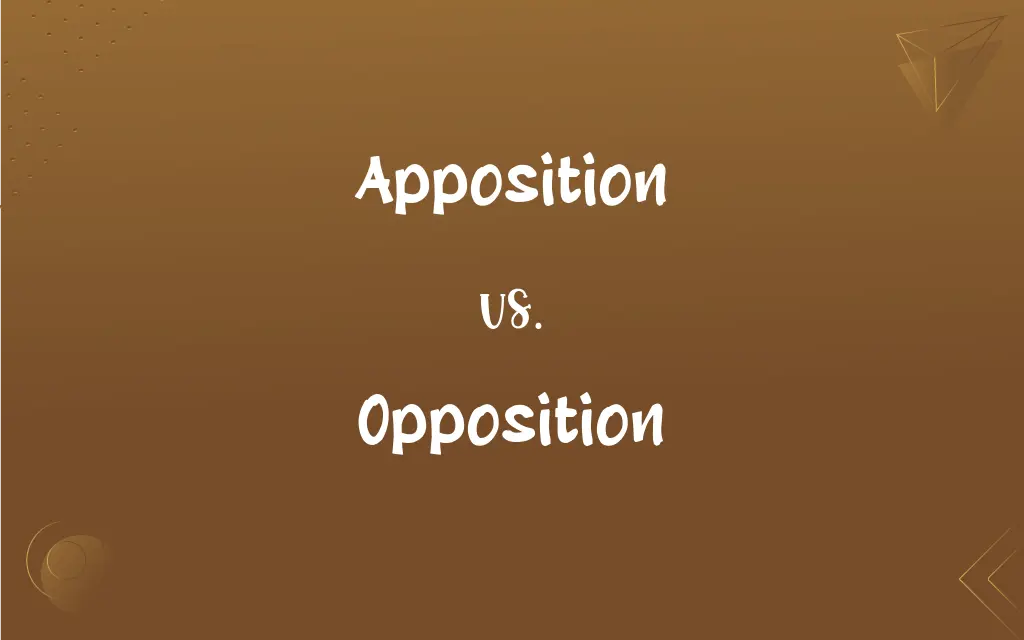Apposition vs. Opposition: What's the Difference?
By Aimie Carlson & Janet White || Updated on May 28, 2024
Apposition refers to placing two elements side by side where one explains or defines the other, while opposition involves a conflict or contrasting relationship between elements.

Key Differences
Apposition is a grammatical construction where two elements, typically noun phrases, are placed next to each other, with the second element serving to define or explain the first. For example, in the phrase "my friend, the doctor," "the doctor" is in apposition to "my friend." Opposition, on the other hand, denotes a state of conflict, resistance, or contrast between two or more elements. This term can be applied in various contexts, such as political opposition, where a group or party contests the actions or policies of another.
In literature, apposition can enrich descriptions by providing more detail about a subject without altering the sentence structure. Whereas in literary or rhetorical contexts, opposition creates tension and highlights differences, enhancing the dynamics of the narrative or argument.
In apposition, the relationship between the elements is typically harmonious and explanatory, ensuring the sentence flows smoothly. In opposition, the relationship is inherently adversarial or comparative, emphasizing divergence and disagreement.
Apposition is often marked by punctuation such as commas, dashes, or colons, indicating a close relationship between the appositive and the noun it defines. Opposition may involve different punctuation, like semicolons or coordinating conjunctions, to show the contrast or conflict between ideas.
Comparison Chart
Definition
Placing elements side by side, one defining the other
Conflict or contrast between elements
ADVERTISEMENT
Usage
Provides additional information or clarification
Highlights differences or resistance
Punctuation
Commas, dashes, colons
Semicolons, coordinating conjunctions
Nature of Relationship
Harmonious and explanatory
Adversarial or comparative
Example Sentence
"My brother, a doctor, is coming."
"She likes tea, but he prefers coffee."
Apposition and Opposition Definitions
Apposition
The positioning of elements next to each other where one explains the other.
The city of Paris, the capital of France, is beautiful.
ADVERTISEMENT
Opposition
A conflict or resistance between two elements or groups.
The proposal met with strong opposition.
Apposition
A grammatical construction where a noun or noun phrase renames another noun right beside it.
My friend Alice is a painter.
Opposition
The act of opposing or standing against something.
He voiced his opposition to the new policy.
Apposition
A linguistic technique for adding detail without changing sentence structure.
Her cat, a Siamese, is very playful.
Opposition
The political party or group opposing the government.
The opposition criticized the new law.
Apposition
An instance of adding descriptive or explanatory phrases to a noun.
John, the captain of the team, was late.
Opposition
The act of opposing or resisting.
Apposition
A method of providing extra information about a subject within the same sentence.
The car, an old sedan, broke down.
Opposition
The condition of being in conflict; antagonism
"The history of men's opposition to women's emancipation is more interesting perhaps than the story of that emancipation itself" (Virginia Woolf).
Apposition
A construction in which a noun or noun phrase is placed with another as an explanatory equivalent, both having the same syntactic relation to the other elements in the sentence; for example, Copley and the painter in The painter Copley was born in Boston.
Opposition
Placement opposite to or in contrast with another.
Apposition
The relationship between such nouns or noun phrases.
Opposition
Something that serves as an obstacle.
Apposition
A placing side by side or next to each other.
Opposition
Often Opposition A political party or an organized group opposed to the group, party, or government in power.
Apposition
(Biology) The growth of successive layers of a cell wall.
Opposition
The position of two celestial objects when their longitude differs by 180°, especially a configuration in which the sun and a superior planet or the moon are on opposite sides of Earth.
Apposition
(grammar) A construction in which one noun or noun phrase is placed with another as an explanatory equivalent, both of them having the same syntactic function in the sentence.
Opposition
The position of the superior planet or the moon in this configuration.
Apposition
(grammar) The relationship between such nouns or noun phrases.
Opposition
(Logic) The relation existing between two propositions having an identical subject and predicate but differing in quantity, quality, or both.
Apposition
The quality of being side-by-side, apposed instead of being opposed, not being front-to-front but next to each other.
Opposition
(Linguistics) Contrast in a language between two phonemes or other linguistically important elements.
Apposition
A placing of two things side by side, or the fitting together of two things.
Opposition
The action of opposing or of being in conflict.
The two politicians are in opposition.
Apposition
(biology) The growth of successive layers of a cell wall.
Opposition
An opposite or contrasting position.
Apposition
(rhetoric) Appositio, the addition of an element not syntactically required.
Opposition
(astronomy) The apparent relative position of two celestial bodies when one is at an angle of 180 degrees from the other as seen from the Earth.
Apposition
A public disputation by scholars.
Opposition
(politics) A political party or movement opposed to the party or government in power.
Leader of the opposition
Apposition
(UK) A (now purely ceremonial) speech day at St Paul's School, London.
Opposition
(legal) In United States intellectual property law, a proceeding in which an interested party seeks to prevent the registration of a trademark or patent.
Apposition
The act of adding; application; accretion.
It grows . . . by the apposition of new matter.
Opposition
(chess) A position in which the player on the move must yield with his king allowing his opponent to advance with his own king.
Apposition
The putting of things in juxtaposition, or side by side; also, the condition of being so placed.
Opposition
(logic) The difference of quantity or quality between two propositions having the same subject and predicate.
Apposition
The state of two nouns or pronouns, put in the same case, without a connecting word between them; as, I admire Cicero, the orator. Here, the second noun explains or characterizes the first.
Opposition
The act of opposing; an attempt to check, restrain, or defeat; resistance.
The counterpoise of so great an opposition.
Virtue which breaks through all opposition.
Apposition
A grammatical relation between a word and a noun phrase that follows;
`Rudolph the red-nosed reindeer' is an example of apposition
Opposition
The state of being placed over against; situation so as to front something else.
Apposition
(biology) growth in the thickness of a cell wall by the deposit of successive layers of material
Opposition
Repugnance; contrariety of sentiment, interest, or purpose; antipathy.
Apposition
The act of positioning close together (or side by side);
It is the result of the juxtaposition of contrasting colors
Opposition
That which opposes; an obstacle; specifically, the aggregate of persons or things opposing; hence, in politics and parliamentary practice, the party opposed to the party in power.
Opposition
The situation of a heavenly body with respect to another when in the part of the heavens directly opposite to it; especially, the position of a planet or satellite when its longitude differs from that of the sun 180°; - signified by the symbol ; as,
Opposition
The relation between two propositions when, having the same subject and predicate, they differ in quantity, or in quality, or in both; or between two propositions which have the same matter but a different form.
Opposition
The action of opposing something that you disapprove or disagree with;
He encountered a general feeling of resistance from many citizens
Despite opposition from the newspapers he went ahead
Opposition
The relation between opposed entities
Opposition
The act of opposing groups confronting each other;
The government was not ready for a confrontation with the unions
The invaders encountered stiff opposition
Opposition
A contestant that you are matched against
Opposition
A body of people united in opposing something
Opposition
A direction opposite to another
Opposition
An armed adversary (especially a member of an opposing military force);
A soldier must be prepared to kill his enemies
Opposition
A political party opposed to the party in power and prepared to replace it if elected;
Her Majesty's loyal opposition
Opposition
A state of being contrary or in disagreement.
Their opinions are in direct opposition.
Opposition
A contrast or antithesis between two ideas.
The story explores the opposition between good and evil.
FAQs
Can you give an example of apposition?
E.g., "My sister, an engineer, designed this bridge."
How does apposition differ from opposition?
Apposition provides clarification or additional information, while opposition involves conflict or contrast.
What role does opposition play in literature?
Opposition creates tension and highlights differences between characters or ideas.
How is apposition typically punctuated?
With commas, dashes, or colons.
Is opposition always negative?
Not necessarily; it can simply indicate contrast.
What is an appositive phrase?
A noun or noun phrase that renames another noun beside it.
What is apposition in grammar?
Apposition is when two elements are placed side by side, with one element explaining or defining the other.
Does opposition only apply to politics?
No, it can apply to any situation involving conflict or contrast.
How do you identify apposition in a sentence?
Look for nouns or noun phrases that rename or explain a nearby noun.
Can apposition be restrictive or non-restrictive?
Yes, apposition can be either, depending on the context.
Is opposition always marked by "but"?
No, it can also be marked by other conjunctions or contrasting words.
Can you have multiple appositions in one sentence?
Yes, multiple appositive phrases can be used for added detail.
Can apposition be used with adjectives?
Apposition is usually used with nouns or noun phrases.
What is a common conjunction used to show opposition?
"But" is a common conjunction indicating opposition.
Does opposition always imply disagreement?
It generally implies some form of contrast or conflict.
Can apposition occur within a single clause?
Yes, apposition typically occurs within the same clause.
Is opposition used in rhetorical arguments?
Yes, it is often used to highlight contrasting points.
What punctuation indicates opposition?
Semicolons and coordinating conjunctions like "but" or "however."
Can opposition strengthen an argument?
Yes, by clearly showing the differences between ideas.
Can apposition involve pronouns?
Yes, as long as they clarify or define the noun.
About Author
Written by
Aimie CarlsonAimie Carlson, holding a master's degree in English literature, is a fervent English language enthusiast. She lends her writing talents to Difference Wiki, a prominent website that specializes in comparisons, offering readers insightful analyses that both captivate and inform.
Co-written by
Janet WhiteJanet White has been an esteemed writer and blogger for Difference Wiki. Holding a Master's degree in Science and Medical Journalism from the prestigious Boston University, she has consistently demonstrated her expertise and passion for her field. When she's not immersed in her work, Janet relishes her time exercising, delving into a good book, and cherishing moments with friends and family.
































































